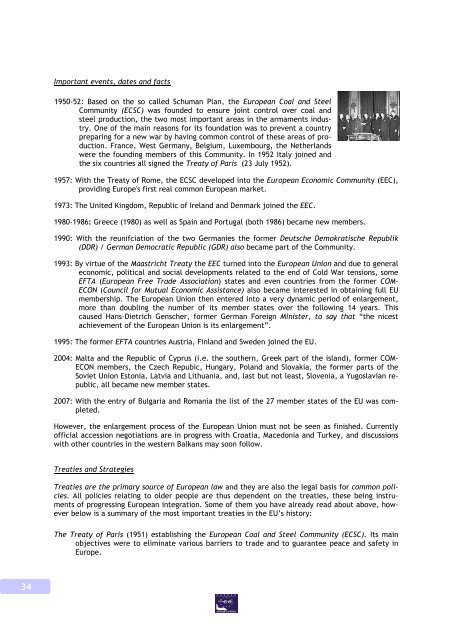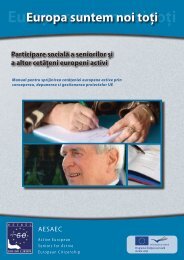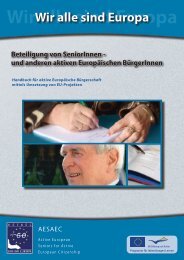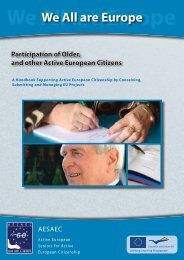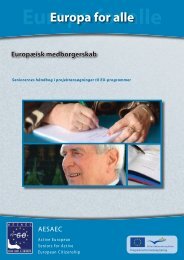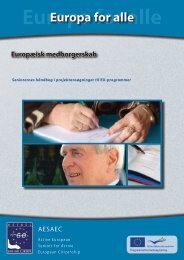We All are Europe - AESAEC
We All are Europe - AESAEC
We All are Europe - AESAEC
You also want an ePaper? Increase the reach of your titles
YUMPU automatically turns print PDFs into web optimized ePapers that Google loves.
Important events, dates and facts<br />
1950-52: Based on the so called Schuman Plan, the <strong>Europe</strong>an Coal and Steel<br />
Community (ECSC) was founded to ensure joint control over coal and<br />
steel production, the two most important <strong>are</strong>as in the armaments industry.<br />
One of the main reasons for its foundation was to prevent a country<br />
preparing for a new war by having common control of these <strong>are</strong>as of production.<br />
France, <strong>We</strong>st Germany, Belgium, Luxembourg, the Netherlands<br />
were the founding members of this Community. In 1952 Italy joined and<br />
the six countries all signed the Treaty of Paris (23 July 1952).<br />
1957: With the Treaty of Rome, the ECSC developed into the <strong>Europe</strong>an Economic Community (EEC),<br />
providing <strong>Europe</strong>'s first real common <strong>Europe</strong>an market.<br />
1973: The United Kingdom, Republic of Ireland and Denmark joined the EEC.<br />
1980-1986: Greece (1980) as well as Spain and Portugal (both 1986) became new members.<br />
1990: With the reunifciation of the two Germanies the former Deutsche Demokratische Republik<br />
(DDR) / German Democratic Republic (GDR) also became part of the Community.<br />
1993: By virtue of the Maastricht Treaty the EEC turned into the <strong>Europe</strong>an Union and due to general<br />
economic, political and social developments related to the end of Cold War tensions, some<br />
EFTA (<strong>Europe</strong>an Free Trade Association) states and even countries from the former COM-<br />
ECON (Council for Mutual Economic Assistance) also became interested in obtaining full EU<br />
membership. The <strong>Europe</strong>an Union then entered into a very dynamic period of enlargement,<br />
more than doubling the number of its member states over the following 14 years. This<br />
caused Hans-Dietrich Genscher, former German Foreign Minister, to say that “the nicest<br />
achievement of the <strong>Europe</strong>an Union is its enlargement”.<br />
1995: The former EFTA countries Austria, Finland and Sweden joined the EU.<br />
2004: Malta and the Republic of Cyprus (i.e. the southern, Greek part of the island), former COM-<br />
ECON members, the Czech Repubic, Hungary, Poland and Slovakia, the former parts of the<br />
Soviet Union Estonia, Latvia and Lithuania, and, last but not least, Slovenia, a Yugoslavian republic,<br />
all became new member states.<br />
2007: With the entry of Bulgaria and Romania the list of the 27 member states of the EU was completed.<br />
However, the enlargement process of the <strong>Europe</strong>an Union must not be seen as finished. Currently<br />
official accession negotiations <strong>are</strong> in progress with Croatia, Macedonia and Turkey, and discussions<br />
with other countries in the western Balkans may soon follow.<br />
Treaties and Strategies<br />
Treaties <strong>are</strong> the primary source of <strong>Europe</strong>an law and they <strong>are</strong> also the legal basis for common policies.<br />
<strong>All</strong> policies relating to older people <strong>are</strong> thus dependent on the treaties, these being instruments<br />
of progressing <strong>Europe</strong>an integration. Some of them you have already read about above, however<br />
below is a summary of the most important treaties in the EU’s history:<br />
The Treaty of Paris (1951) establishing the <strong>Europe</strong>an Coal and Steel Community (ECSC). Its main<br />
objectives were to eliminate various barriers to trade and to guarantee peace and safety in<br />
<strong>Europe</strong>.<br />
34


